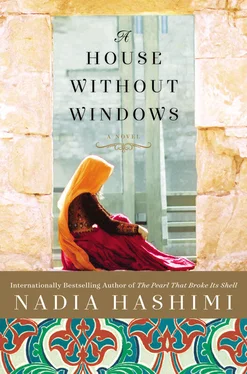“Your Honor, I respectfully disagree,” said Yusuf. “I’m not anyone’s puppet and I don’t think my colleague here is either. I think there are plenty of people working for the good of the country and our countrymen. I think we do all want the same things.”
“At the end of the day, Yusuf, no one will trust you. They barely trust me. If you don’t see that now, you’ll see it soon.”
Yusuf sighed deeply. The judge was right and he knew it. He’d seen it in the way the prison guards had looked at him, the way the villagers had refused to open their doors more than a sliver, and the way the taxi driver kept looking up into his rearview mirror.
“Yusuf, go to the shrine, get Zeba, and bring her back to Chil Mahtab. Get an idea of how she’s doing now.” The fan had stopped oscillating. Trapped in one position, it clicked and buzzed in vain, barely ruffling the pages of Yusuf’s notepad. The judge didn’t seem to notice. “I’m going to spend some time thinking about this, and then I’ll talk once more with Hakimi to see if anything new has come up in the village.”
Yusuf left the judge’s office and headed directly to the bathroom. He wet a paper towel and wiped down his face and neck. He dug into his bag and found the bottle of eyedrops, shook it, and leaned his head back to catch the drops in between his lids. He blinked rapidly, feeling the coolness move from his lashes to his cheeks like tears.
GULNAZ WATCHED FROM A DISTANCE, WISHING SHE COULD SEE through the outer walls of the house. There was no way of knowing who was home. The apprehension she felt had sharpened considerably during the taxi ride coming over.
She closed her eyes and pictured her grandson, her granddaughters. Basir bore an uncanny resemblance to his uncle, Rafi. When he’d been a baby, Gulnaz had often slipped and called him by her son’s name. It was, she knew, her heart’s urge to return to the days when she could wrap her arms around a child and breathe in the scent of his sun-warmed hair or feel him fitting himself perfectly into the curves of her body. Rafi’s children were blessings, but they pulled away from her quickly. Gulnaz knew it was their mother’s doing. Shokria tolerated her presence and acted as the dutiful daughter-in-law but they’d never had the closeness Gulnaz had craved. Shokria knew she could never replace Zeba, and Gulnaz kept her daughter-in-law at arm’s length, as if it would be a betrayal to her own daughter to do anything else.
There was no alchemy that could change the past. There were only the days ahead, be they few or many. There was only the chance that an ember could be recovered from the ashes and breathed back to life. That was why Gulnaz stood in front of Tamina’s house and tried to will the door to open. She would have waited longer, but the sun was beating down on her and it was unbecoming for a woman her age to loiter in an unknown neighborhood.
Gulnaz moved toward the house, planning her words with each step. She knocked on the gate and moved back, adjusting her head scarf and straightening her back. She wiped the moisture from her upper lip with a handkerchief and put it back in the black handbag hooked on her elbow.
She heard a flurry of footsteps and shouts. Never, in all the times she’d knocked on her daughter’s door, had she heard the excitement of childhood — a certain sign that Zeba, Basir, and the girls had been too ashamed to invite anyone in. When Zeba had opened the door, it had always been just a crack, wide enough only to see who had come calling. The children would peer out from windows or inner doorways. There was a reluctance in the way Zeba would step back and pull the groaning metal door wide. The door, too, had been complicit in the resistance.
Gulnaz had known something was wrong, but she’d only seen part of the picture. She shuddered to think of how much she’d missed.
“ Salaam, ” said a young girl close to Kareema’s age. The sun was on Gulnaz’s back, making the child squint and curl half her mouth in a lopsided smile that she reserved for strangers.
“ Wa-alaikum, little girl.” Gulnaz tried to peer behind her without gawking. The small courtyard looked tidy. There were no immediate signs of disarray. “Is your mother home? I’ve come to visit my grandchildren. Basir and the girls — are they here?”
“Yes, Khala- jan, ” she exclaimed politely. She motioned with one grand sweep of the arm for Gulnaz to step inside. “Please do come in.”
“I don’t want to intrude,” Gulnaz said. “If you don’t mind calling them to come outside, I’ll wait for them here.”
The young girl looked uncomfortable. She was probably around ten years old and knew better than to leave an older woman standing on the street. She shifted her weight and tried once more.
“Please, Khala- jan, it’s nothing. Come inside and I will call them. It’s not right for you to stand in this sun.”
The sound of laughter came from within the home. It propelled Gulnaz forward despite her reluctance to enter the home of Kamal’s sister. She could be thrown out at any moment. Just as Gulnaz entered the courtyard, Tamina came out to see who had called. She was drying her hands on her skirt and didn’t recognize Gulnaz immediately. The branches of a sparsely leafed pear tree brushed against her shoulder. The moment she realized who stood before her, her feet came to an abrupt stop.
“Tamina- jan, ” Gulnaz said softly. “Forgive me for coming to your home unannounced.”
Tamina’s eyes grew wide and her breathing slowed. She stood perfectly still.
It was up to Gulnaz to fill the silence with some kind of explanation for her presence.
“I’m here only to see my grandchildren. I do not wish to disturb you or your family in any way. I know you’ve been generous in caring for them after what happened to your brother, God forgive him.”
When Tamina still failed to respond, Gulnaz debated leaving. Pleading was beneath her, but this situation was different. She had every reason to believe her daughter had killed Tamina’s eldest and only brother. His family had the right to demand blood for her crime, even if the justice system hadn’t yet reached a conclusion. She took a deep breath and continued.
“I never wanted such ugliness to affect this family, especially the children. They are innocent souls. If I could please see Basir and the girls, I will not bother you. I can walk with them outside and not disturb you or your children.”
Gulnaz snuck a glance at the house. She could hear voices within, talking and laughing. She hoped Tamina’s husband was not home. She had no interest in facing more people from the family.
“Madar- jan, ” said the young girl softly. “Should I go call Basir and the others?”
Tamina took a deep breath and shook her head.
“I cannot believe you’ve come here,” she said in a voice husky with anger. “You’ve traveled a long way to see your grandchildren.”
Gulnaz cleared her throat.
“I did.”
People were always impressed with how far she’d gone, as if the physical distance between two places were the greatest obstacle she had to overcome.
“What made you think it was all right to appear at my door. . in my home?” Tamina shot her daughter a look and motioned for her to go inside the house. Her daughter vanished without a word of protest, understanding that if she was to continue listening to this conversation she would have to do so from inside. Tamina was no longer still. She’d taken a step closer to Gulnaz, bringing the distance between them to the length of a man’s body.
“I am not here for any purpose other than to see my grandchildren,” Gulnaz repeated calmly. She raised her hands in a gesture of surrender. “I am not here to offer explanations or deliver messages of apology. I will not bother you with any empty words of condolence.”
Читать дальше











